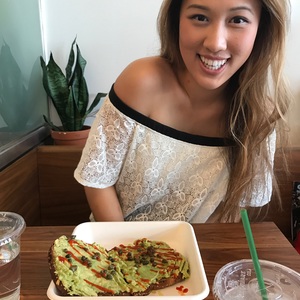This October, Spoon Duke took a bonding trip to the Duke Campus Farm (DCF), where we volunteered and learned about the farm’s significance to the Duke community. The day was sunny, moderately warm and perfect for working outside. We split into small groups and took up different tasks on the Farm. One group planted Jerusalem artichokes (a vegetable that looks like an adorable cross between a little potato and ginger). The second group learned about kale while weeding dead leaves, and another helped compost by chopping waste with machetes.

After what felt like a workout, we gathered under the trellis where the luffa gourds grow (who knew you could grow luffas!). We tasted some fresh vegetables that are grown on the farm, while learning how important it is to support DCF as members of the Duke community.

We then spoke to assistant program manager Emily McGinty, who was kind enough to share with us the labor of love that we call the Duke Campus Farm. Here are some answers to the burning questions we know you all have.
How did DCF get started?
The farm actually began as class project in 2010. In a class called Food and Energy, a small team of students created a hypothetical plan for a campus farm. It seemed like a fantasy plan, the kind you create for a class project and forget about after your final paper is submitted. This all changed when Emily Sloss (then, a senior) decided that the project had the potential to expand beyond. She wanted it to become a vital part of the Duke community.
Passionate and confident about what her team had created, Sloss bravely brought the farm proposal before President Broadhead. Then with the support of the Duke administration, farm neighbors, and faculty members, this fantasy soon became a running reality. DCF broke ground in November 2011, and is now thriving in its 6th growing season.
Why do we have a farm?
Beyond being an acre of land where sustainable eating begins, DCF is an educational space where students can learn about anything from food systems and food policy, to seed genetics and the agricultural history of the South. The farm helps Duke students realize that we can become more accountable members of our shared food system. DCF works towards this goal by offering volunteer work days every Thursday and Sunday, staff-led workshops, academic classes, independent studies, and paid student internships. The Duke Campus Farm is a place for YOU to learn and grow (pun intended).
Where does DCF’s food go?
Your tummy! Much of the farm’s fruits and veggies are sold to Duke Dining, including Marketplace and parts of West Union. Given that West Union is brand new (and made up of outside vendors), Duke Dining is working to foster relationships between DCF and the vendors. If you want to enjoy farm-fresh produce at West Union today, look out for the signs that indicate the food is from DCF.
For those of you who want to bring the farm home with you, DCF also a runs a CSA (Community Supported Agriculture). You can buy a subscription to pick up a weekly box of diverse and seasonal produce.
How can we support the farm?
The best way you can support DCF is to speak up! Show that you want your food to be fresh, sustainable, and grown locally. By volunteering at the farm (by yourself or with a group!) and considering ways you can take advantage of the educational space, you send the message that you support our farm and the benefits of sustainable eating. Demonstrating that the Duke community cares about our environment, health, and the efforts of fellow Blue Devils.
Get out to the farm on a Thursday or Sunday afternoon from 3-5 pm for a community workday. See the space, get ideas, and use your experience as a catalyst for further conversation with the Duke community. If you find your passion at DCF, you can even join the paid student crew of undergraduate and grad students who work on the farm for 8 to 12 hours every week.
Why should we eat local and seasonal?

There are some misconceptions about eating local – e.g. it’s only for vegan hippies with environmental science majors. Some argue that eating local conflicts with economic prosperity and the principle of division of labor. Others see that it is an impractical way of gaining a diverse range of food. What many don’t realize is that eating local doesn’t constrain us to just the farm down the block from us. In fact, eating “local” can span across several states, where a diversity of crops are exchanged and shared.
Moving towards a community-based ecosystem means reducing transmission miles, transportation costs, and maintenance waste. It also prevents produce from being thrown out for its looks. Even better? It can benefit our health. Eating locally means we can enjoy seasonal fruits and vegetables that are harvested at the peak of their nutrients and flavor.
The Duke Campus Farm is an incredible resource on campus that students don’t often discover until later on in their Duke career. It is an opportunity for all Blue Devils to enjoy a fun afternoon outdoors, learn about where our food comes from, and give back to the Duke community. So find some clothes you don’t mind getting a lil’ dirty, and see you there!








